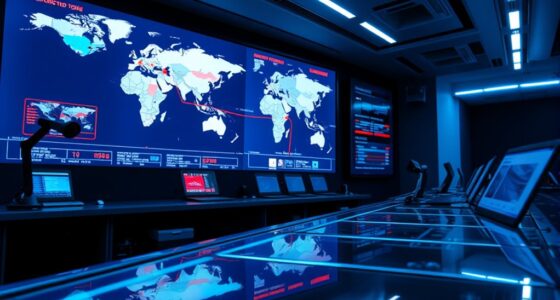Everyday Filipinos often find themselves intertwined in espionage, acting as either spies or unwitting observers in their nation’s complex intelligence landscape. From historical guerrilla networks during WWII to contemporary issues involving spying activities, the stakes are high. Technology plays a key role in shaping these dynamics, while legal frameworks struggle to keep up. Motivations vary from financial gain to ideological beliefs. There’s much more to uncover about how ordinary lives intersect with the shadowy world of espionage.
Key Takeaways
- Everyday Filipinos may inadvertently gather intelligence through observations, acting as informal observers in their communities without realizing their potential role in espionage.
- Historical contributions during WWII showcase Filipinos engaging in guerrilla networks, blending ordinary lives with espionage efforts against Japanese occupation.
- Modern technology, including smartphones and social media, enables everyday Filipinos to collect and share information that could be exploited for espionage purposes.
- Financial gain, ideological beliefs, or coercion can transform ordinary citizens into spies, blurring the line between observer and participant in espionage activities.
- Recent espionage incidents highlight the risk of everyday individuals unknowingly becoming involved in complex international intelligence operations, raising awareness of their surroundings.
The Context of Espionage in the Philippines

Although espionage may seem like a distant concept, it has deep roots in the Philippines, shaped by historical events and ongoing geopolitical tensions.
During World War II, Filipinos played significant roles in espionage, often working within guerrilla networks to resist Japanese occupation. Some even became double agents, gathering intelligence for the enemy. Their contributions to the Allied Intelligence Bureau proved essential for military operations.
Fast forward to today, and espionage remains relevant, with recent arrests linked to Chinese spying activities aimed at mapping military bases.
This historical context highlights how espionage has woven itself into the fabric of Filipino society, stirring feelings of national pride while also fostering an underlying distrust among communities.
The Role of Technology in Modern Espionage

Espionage has evolved considerably since the days of guerrilla networks during World War II, and today, technology plays a pivotal role in shaping intelligence operations.
You’ll find that artificial intelligence enhances data analysis, making operations more efficient. The Internet of Things provides numerous surveillance opportunities, but it also brings security risks. Quantum computing promises better encryption and faster data processing.
Autonomous systems, while useful for reconnaissance, are vulnerable to cyber attacks. You should also consider the ethical implications of biometrics and data privacy in the digital age.
Autonomous systems enhance reconnaissance but face cyber vulnerabilities; ethical considerations around biometrics and data privacy are crucial in today’s digital landscape.
As you navigate this landscape, adaptability and vigilance become essential in countering emerging threats, ensuring that espionage remains effective in a rapidly changing technological world.
Legal Framework Governing Espionage Activities

As the landscape of espionage evolves, the legal framework governing these activities must adapt to address emerging threats effectively.
Current laws, like the Revised Penal Code and Commonwealth Act No. 616, primarily focus on wartime espionage, leaving gaps during peacetime. Proposed bills, such as House Bill 10983 and Senate Bill No. 2980, aim to enhance penalties for espionage, including life imprisonment and fines up to P50 million.
Additionally, the Intellectual Property Code and the Data Privacy Act are essential in regulating corporate espionage.
With modern threats evolving, lawmakers need to prioritize updates to these laws, ensuring they’re robust enough to protect national security and address the challenges posed by foreign intelligence and cybercriminals.
Implications of Espionage on International Relations

When nations engage in espionage, they often find themselves entangled in a web of diplomatic tensions that can escalate into serious conflicts. Discovering espionage activities can trigger retaliatory actions or even military confrontations, further straining international relations.
You might notice that economic sanctions frequently follow such incidents, disrupting trade and cooperation between nations. These measures can ripple through global markets, affecting economies far beyond the involved countries.
Additionally, espionage can shift alliances and power dynamics, as nations reassess partnerships out of distrust. Ultimately, the implications of espionage are profound, undermining security and cooperation, while complicating efforts to establish international laws that could mitigate these tensions and enhance global stability.
Understanding the Motivations Behind Espionage Activities

Understanding the motivations behind espionage activities sheds light on why individuals and nations engage in such clandestine operations.
You might find that financial gain is a powerful motivator, whether driven by greed or urgent personal needs like medical bills.
Ideological differences also play a role; if you disagree with government policies, you might feel compelled to spy.
Compromise and coercion can push someone into espionage, especially when blackmail is involved.
Thrill-seeking and the desire for power can further entice individuals.
Additionally, technology facilitates access to classified information, making espionage more tempting.
Ultimately, personal beliefs, psychological factors, and opportunities intertwine, driving many to cross ethical lines for various reasons.
Understanding these motivations is essential for grasping the complexities of espionage.
Frequently Asked Questions
What Are the Signs Someone Might Be Involved in Espionage?
If you suspect someone might be involved in espionage, look for unusual login patterns, like accessing systems at odd hours or from unexpected locations.
Notice any secrecy about their work and signs of conflicting loyalties.
Watch for unauthorized data transfers or excessive downloading of sensitive information.
Also, be alert to physical signs like missing documents or unusual behavior in restricted areas.
These could all be red flags indicating potential espionage activity.
How Can the Public Report Suspicious Espionage Activities?
You might think reporting suspicious activities is pointless, but every bit of vigilance matters.
If you notice unusual behavior, like someone taking photos of restricted areas or asking too many questions about sensitive topics, report it immediately.
Use hotlines or online platforms set up by local authorities—your observations can help.
What Are the Consequences for Innocent Individuals Accused of Espionage?
If you’re accused of espionage, the consequences can be severe, even if you’re innocent.
You might face legal battles that drain your resources and time. Public perception can turn against you, leading to social stigma and damaged relationships. Employment opportunities could vanish, and travel restrictions might limit your freedom.
Additionally, your country could suffer economically due to diplomatic tensions, impacting not just you but your community as well. It’s a challenging situation to navigate.
Are There Any Protections for Whistleblowers in Espionage Cases?
There’re limited protections for whistleblowers in espionage cases in the Philippines.
While general civil service laws offer some safeguards against retaliation, specific legislation for espionage is lacking.
You might qualify for state protection under the Witness Protection Program if you testify in a judicial proceeding.
However, enforcement remains a challenge, and penalties exist for those who retaliate or provide false information.
Confidentiality is also prioritized to guarantee your safety.
How Do Cultural Attitudes Affect Perceptions of Espionage in the Philippines?
In the Philippines, cultural attitudes towards espionage often clash like stormy seas against a rocky shore.
You might perceive foreign influence with suspicion, shaped by historical experiences and economic ties. As you navigate daily life, the fear of infiltration can heighten your vigilance.
Yet, cultural exchanges create a complex web, blurring the lines between friendship and betrayal. This duality influences how you view espionage, balancing trust and skepticism in your interactions.
Conclusion
In a world where nearly 80% of Filipinos are active internet users, the line between being a casual observer and an unwitting spy blurs. With technology at our fingertips, everyday citizens can gather information without even realizing it. As we navigate this complex landscape, it’s essential to understand the implications of our actions. You might just be a keen observer, but remember: your insights could be invaluable—or even dangerous—in the game of espionage. Stay aware!









